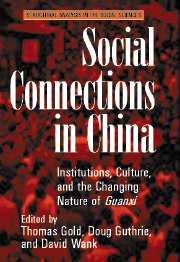Book contents
- Frontmatter
- Contents
- Contributors
- List of Figures and Tables
- Prologue
- Introduction
- Methodological and Conceptual Considerations
- New Substantive Studies of Guanxi
- 4 Guanxi in Business Groups: Social Ties and the Formation of Economic Relations
- 5 Business-State Clientelism in China: Decline or Evolution?
- 6 Institutional Holes and Job Mobility Processes: Guanxi Mechanisms in China's Emergent Labor Markets
- 7 Youth Job Searches in Urban China: The Use of Social Connections in a Changing Labor Market
- 8 Face, Norms, and Instrumentality
- 9 Guanxi and the PRC Legal System: From Contradiction to Complementarity
- 10 “Idle Talk”: Neighborhood Gossip as a Medium of Social Communication in Reform Era Shanghai
- Conclusions
- References
- Index
8 - Face, Norms, and Instrumentality
Published online by Cambridge University Press: 30 July 2009
- Frontmatter
- Contents
- Contributors
- List of Figures and Tables
- Prologue
- Introduction
- Methodological and Conceptual Considerations
- New Substantive Studies of Guanxi
- 4 Guanxi in Business Groups: Social Ties and the Formation of Economic Relations
- 5 Business-State Clientelism in China: Decline or Evolution?
- 6 Institutional Holes and Job Mobility Processes: Guanxi Mechanisms in China's Emergent Labor Markets
- 7 Youth Job Searches in Urban China: The Use of Social Connections in a Changing Labor Market
- 8 Face, Norms, and Instrumentality
- 9 Guanxi and the PRC Legal System: From Contradiction to Complementarity
- 10 “Idle Talk”: Neighborhood Gossip as a Medium of Social Communication in Reform Era Shanghai
- Conclusions
- References
- Index
Summary
During the first half of the 1990s, I researched the social and political consequences of the local economic reforms and transformation of two villages in periurban Shanghai. Over the course of two decades since the introduction of Deng's economic reforms in 1978, those villages experienced the reintroduction of a cash economy, the rapid expansion of rural industry, integration into regional labor markets, and encroachment of urban life on village soil. Almost every facet of villagers' social life – daily routines, regular interactions, and the mode of exchange – changed. This chapter traces the social changes wrought by economic reforms and the attendant transformation of local economic practice. In particular, I will analyze the changing contours of Chinese particularistic ties, guanxi. To preview my findings, I will argue that the economic reforms significantly recast guanxi in two ways: (1) guanxi became increasingly imbued with a commercial quality, and (2) the geographical distance of guanxi increased as a result of integration into the regional economy. Both of these developments would seem to lead to a greater emphasis on instrumentalism in social relations. However, I find that the development of cash-based exchange and long-distance guanxi are not inherently more instrumental than labor-based and proximate guanxi.
The chapter analyzes the mutual aid and money-based exchanges that occur during the agricultural busy season (nongmang) and during house construction. After local decollectivization in 1983, the pre-revolutionary practice in agriculture reemerged. I account for the reappearance and later decline in agricultural mutual aid.
- Type
- Chapter
- Information
- Social Connections in ChinaInstitutions, Culture, and the Changing Nature of Guanxi, pp. 163 - 178Publisher: Cambridge University PressPrint publication year: 2002
- 8
- Cited by



